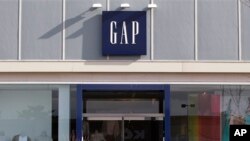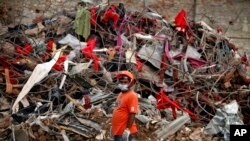DHAKA —
Major U.S. retailers, including Gap Inc., declined to endorse an accord on Bangladesh building and fire safety backed by Europe's two biggest fashion chains, a trans-Atlantic divide that may dilute garment industry reform efforts.
Three weeks after the collapse of a building housing garment factories, which killed more than 1,100 people, Western brands that rely on Bangladesh to produce clothing cheaply disagreed over how best to ensure worker safety.
Gap said it was ready to sign on "today'' to an agreement already endorsed by European companies, including Italian clothing retailer Benetton, Britain's Marks & Spencer, Sweden's H & M Hennes & Mauritz AB and Spain's Inditex SA, but first wanted a change in the way disputes are resolved in the courts.
“With this single change, this global, historic agreement can move forward with a group of all retailers, not just those based in Europe,'' Eva Sage-Gavin, an executive in Gap's global human resources and corporate affairs department, said in a statement.
A series of deadly incidents at factories, including a fire in November that killed 112 people, has focused global attention on safety standards in Bangladesh's booming garment industry, the world's biggest exporter of clothing after China.
Wal-Mart Stores Inc., the world's biggest retailer, called on Bangladesh to shut one factory and examine another after its own inspections found safety problems.
Major brands and retailers set a May 15 deadline to join the agreement after talks in Germany last month. As of Tuesday morning, the only U.S. company to announce it had signed on was PVH, which owns brands including Calvin Klein.
Europe accounts for about 60 percent of Bangladesh's clothing exports, so even without participation from the big U.S. retailers, the agreement may bring some change in a country that has seen at least three deadly garment factory disasters in the span of six months.
Mohammad Atiqul Islam, president of the Bangladesh Garment Manufacturers and Exporters Association, said the deal was a bit of good news in the “worst time for us.”
“We believe this decision will motivate other big buyers across the West and the USA to join their hands with us,'' he told Reuters.
Li & Fung Ltd, which supplies dozens of major retailers, including Walmart, said it was "continuing to look at'' the European pact, but declined to give details. Bangladesh is second only to China in Li & Fung's global supply chain.
“We don't think the answer is to move away from Bangladesh,” Bruce Rockowitz, Li & Fung's group president and chief executive, told reporters after a shareholder meeting in Hong Kong on Tuesday.
“The answer is actually to invest more and try to make safety better and work with the government on doing a better job on monitoring buildings,” he added.
Three weeks after the collapse of a building housing garment factories, which killed more than 1,100 people, Western brands that rely on Bangladesh to produce clothing cheaply disagreed over how best to ensure worker safety.
Gap said it was ready to sign on "today'' to an agreement already endorsed by European companies, including Italian clothing retailer Benetton, Britain's Marks & Spencer, Sweden's H & M Hennes & Mauritz AB and Spain's Inditex SA, but first wanted a change in the way disputes are resolved in the courts.
“With this single change, this global, historic agreement can move forward with a group of all retailers, not just those based in Europe,'' Eva Sage-Gavin, an executive in Gap's global human resources and corporate affairs department, said in a statement.
A series of deadly incidents at factories, including a fire in November that killed 112 people, has focused global attention on safety standards in Bangladesh's booming garment industry, the world's biggest exporter of clothing after China.
Wal-Mart Stores Inc., the world's biggest retailer, called on Bangladesh to shut one factory and examine another after its own inspections found safety problems.
Major brands and retailers set a May 15 deadline to join the agreement after talks in Germany last month. As of Tuesday morning, the only U.S. company to announce it had signed on was PVH, which owns brands including Calvin Klein.
Europe accounts for about 60 percent of Bangladesh's clothing exports, so even without participation from the big U.S. retailers, the agreement may bring some change in a country that has seen at least three deadly garment factory disasters in the span of six months.
Mohammad Atiqul Islam, president of the Bangladesh Garment Manufacturers and Exporters Association, said the deal was a bit of good news in the “worst time for us.”
“We believe this decision will motivate other big buyers across the West and the USA to join their hands with us,'' he told Reuters.
Li & Fung Ltd, which supplies dozens of major retailers, including Walmart, said it was "continuing to look at'' the European pact, but declined to give details. Bangladesh is second only to China in Li & Fung's global supply chain.
“We don't think the answer is to move away from Bangladesh,” Bruce Rockowitz, Li & Fung's group president and chief executive, told reporters after a shareholder meeting in Hong Kong on Tuesday.
“The answer is actually to invest more and try to make safety better and work with the government on doing a better job on monitoring buildings,” he added.

